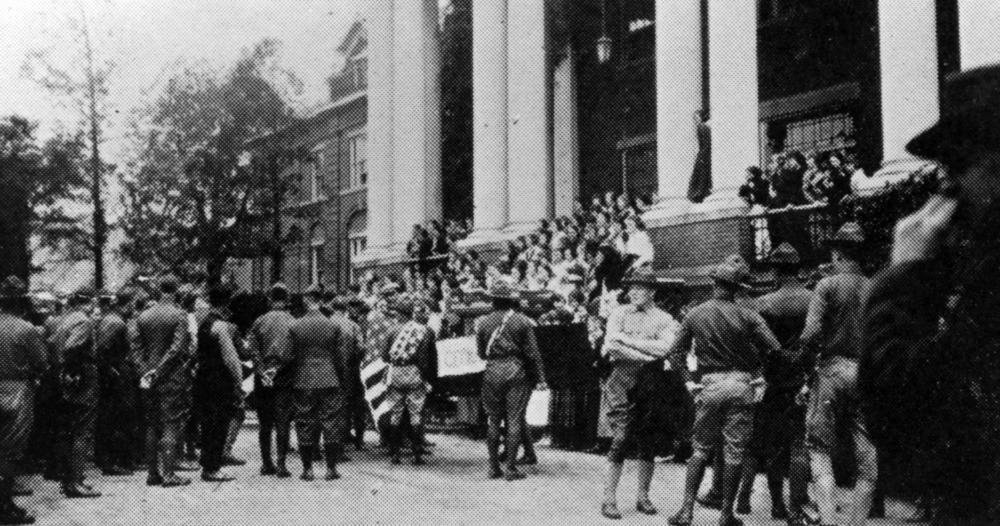
Armistice Day
Special Collections concludes our commemoration of the 100th anniversary of U.S. participation in World War I and the impact that it had on NC State students, faculty, and campus. Today we look at the Armistice Day celebrations. World War I concluded on 11 November 1918 with the Armistice (the fighting ceased in France at 11:00 am), and there was great celebration that day in all Allied countries (United States, France, Great Britain, etc.). Below are recounted the experiences of three NC State students and alumni the day the war ended.
William H. Rogers, Jr. (Class of 1916) was a army lieutenant in the thick of battle in France when the Armistice came. "The fighting was awful," he wrote in a letter to his mother (and published in the January 1919 Alumni News and other newspapers), adding "yet I was lucky enough to come out unscratched. I have not washed for four or five days, eaten very little, and haven't closed my eyes for forty-eight hours." He reported on the last battle:
"I shall never forget the eleventh of November at 11 o'clock. Everything [the fighting] was going full tilt. We had heard that it would stop, but did not believe it. At five minutes to 11 o'clock we said it surely would not end, but at 11 o'clock everything stopped as if an electric current had been broken. It was certainly startling in its suddenness."
Other NC State students experienced the celebrations occurring in French cities. One was Lieutenant Robert Kohloss, who attended NC State in 1915-1917. He was an aerial observer who flew over enemy lines 38 times, and he was hit near the end of the war. His wounds weren't serious, and he was recouperating in Paris when the Armistice was signed. He told (as reported in the October 1919 Alumni News) that "Paris went wild when news of the armistice came. . . . You can't imagine it unless you had been there and seen it. Such demonstrations of joy could not be thought possible." Swept up in the festivities, he later returned to his hotel room, only to find another uniformed man sleeping there. The man woke and said, "Don't mind me. It's nobody but a d--n chaplain drunk." Kohloss's story concluded by stating that the man " . . . like everybody else had gotten drunk over the news."
Lieutenant Reid Page (Class of 1916) also found himself surrounded by revelers in the French city of Lyons. The April 1919 Alumni News recounted what he and other American soldiers saw during the celebration: "the Americans found the big town fairly crazy with joy. Dignified majors rode hatless on the tops of public 'buses, waving flags and shouting like school boys. Everybody was singing the Marseillaise [the French national anthem] and kissing everybody else." In the confusion Page experienced this humorous mishap:
"Now it is necessary at this point to admit that Reid Page's friends sometimes accuse him of being girl-shy, and it is a sworn fact that he has exhibited fewer symptoms of trepidation in the presence of a hand grenade than in the presence of an ordinary baby. Imagine his consternation, then, when he found himself standing on a crowded street corner in Lyons, clutching a howling infant, thrust unceremoniously into his unwilling arms by a young woman who seemed bent on keeping up with a gay fragment of the merry-making throng. Imagine, too, Reid Page making a frenzied dash after the young woman, whose offspring was yelling lustily for its departing mama, and this dignified young officer, aided by a sympathetic but all to obviously amused police force, continuing his luckless search far into the night, while the little scrap of deserted and wailing humanity still clung to his good right arm."
They finally located the mother at 10:00 am the next day.
Since 1919, November 11 has been commemorated annually. Originally known as Armistice Day, it has been an official U.S. holiday since 1938 and known as Veterans Day since 1954. At NC State, the earliest commemorations of Armistice Day were annual football games with Virginia Tech (then called VPI), and marches of ROTC companies in local parades. The cornerstone of the Bell Tower was laid during an Armistice Day ceremony (albeit a day early) on 10 November 1921. More information on early Armistice Day commemorations can be found on our Rare & Unique Digital Collections website.



